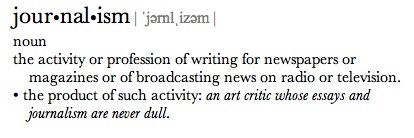On a basic level, I do think blogging is a journalistic endeavour. More so today than at any other time in history. After reading a piece by Peter Nowak wherein he says blogging cannot be journalism without an editor – I wanted to respond to that idea. It’s not a bad idea (heck, he may even be right) – but I disagree. And, while, I have never had an editor, I can certainly say I’ve seen enough of traditional journalism and just outright poorly written articles that seemly include the use of editors. If we consider the above definition, journalism can never be a blog. But, if we consider journalists as members of the Fourth Estate – this definition changes. Blogs with or without editors can claim to be journalists, and I’ll explain why.
I’ve also written about this in the past too, so it’s not completely new ground. The idea that a blogger cannot be a protected journalist is, to me, a ludicrous notion at best. The Internet may have flattened the playing field, but the field still includes all types of writers interests. The definition of journalist is simply outdated.
Those types are what occur naturally in social settings anyway. Have you ever had a conversation about a topic with a number of people and within moments, everyone knows who’s the authority on the subject? This may or may not be because of valid information, but the authority on any particular topic will eventually rise from the pack and speak.
Blogging isn’t much different. When there are millions of cat and dog blogs, somehow and some way, you’ll find your way to a blog that happens to be the authority on the subject you’re searching for. This is certainly no accident and that sort of learned influence is what humans are all about. I would even say that since the Internet itself allows for these changes in influence – that it is largely superior to traditional journalism that generally falls from grace at a snail’s pace and likely doesn’t have to fight to prove influence at such a rapid pace.
But what about the editor? The newspaper is an authority because it was learned and passed down by generations. The editor though, can be found easily as the Internet provides many places to look over and check your work (in whatever form it may be). The idea of what makes a newspaper an authority on anything is what I talked about in journal-schim. Today, it is true that many see a blog as no more than a personal daily journal or log (yes, the b might just be a backwards d) – but the same people likely also see that blogs can be so much more. Back in the early nineties, many also could not see the commercial possibilities of the web – and the Internet proved them wrong too.
So, the rest is simply getting it right and the hard slog of proving to your readers that you are, in fact, an authority on any particular topic. If you fail, your blog will not be seen or read much. Succeed and you too may see a cease and desist letter or two.
If I look at a recent ruling by judge Hernandez – I am incapable of being a journalist based on the first two points.
(1) education in journalism
(2) any credentials or proof of any affiliation with any recognized news entity
(3) proof of adherence to journalistic standards such as editing, fact-checking, or disclosures of conflicts of interest
(4) keeping notes of conversations and interviews conducted
(5) mutual understanding or agreement of confidentiality between the defendant and his/her sources
(6) creation of an independent product rather than assembling writings and postings of others
(7) contacting “the other side” to get both sides of a story.
Requirement 6 is interesting too. Loosely taken, it doesn’t account for the very nature of the web itself – a series of links and products taken from other places (that are often attributed to others in some way). This blog post is an example – Peter Nowak gave me something to write about and I’ve reproduced (word for word) the points in judge Hernandez’s ruling to form my idea. The fact that they have contributed to this idea are vital to how blogging works. If it’s just blatant plagiarism (as some blogs do), that’s unacceptable. If it’s new thoughts and ideas formed from attributed sources – that’s ok.
